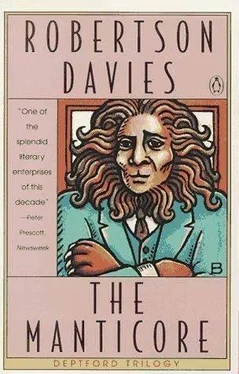In time, however, quite a big dossier of dreams accumulated, which the doctor filed, and of which I kept copies. I had taken rooms in Zurich; a small service flat, looking out on a courtyard, did me very well; meals with wine could be taken at the table d'hote , and I found after a time that the wine was enough, with a nightcap of whisky, just so that I should not forget what it tasted like. I was fully occupied, for the doctor gave me plenty of homework. Making up my notes for my next appointment took far more time than I had expected – quite as much as preparing a case for court – because my problem was to get the tone right; with Johanna von Haller I was arguing not for victory, but for truth. It was hard work, and I took to napping after lunch, a thing I had never done before. I walked, and came to know Zurich fairly well – certainly well enough to understand that my knowledge was still that of a visitor and a stranger. I took to the museums; even more, I took to the churches, and sometimes sat for long spells in the Grossmunster, looking at the splendid modern windows. And all the time I was thinking, remembering, reliving; what I was engaged on with Dr. von Haller (which I suppose must be called an analysis, though it was nothing like what I had ever imagined an analysis to be) possessed me utterly.
To what extent should I surrender myself, I asked, and as I asked I was aware that the time for turning back had passed and I no longer had any choice in the matter. I even lost my embarrassment about dreams, and would take a good dream to my appointment as happily as a boy who has prepared a good lesson.
(The dream dossier I kept in another notebook, and only a few references to its contents appear here. This is not wilful concealment. The dreams of someone undergoing such treatment their say in series, and only rarely is a single dream revelatory. Reading such a record of dreams is comparable to reading the whole of a business correspondance when preparing for a case – dull panning for gold, with a hundredweight of gravel discarded for every nugget.)
Indifference gave way to distaste. The doctor seemed to me to be a commonplace person, not as careful about her appearance as I had at first thought, and sometimes I suspected her of a covert antipathy toward me. She said things that seemed mild enough until they were pondered, and then a barb would appear. I began to wonder if she were not like so many people I have met who can never forgive me for being a rich and privileged person. Envy of the rich is understandable enough in people whose lives are lived under a sky always darkened by changing clouds of financial worry and need. They see people like me as free from the one great circumstance that conditions their lives, their loves and the fate of their families – want of cash. They say, glibly enough, that they do not envy the rich, who must certainly have many cares; the reality is something very different. How can they escape envy? They must be especially envious when they see the rich making fools of themselves, squandering big sums on trivialities. What that fellow has spent on his yacht, they think, would set me up for life. What they do not understand is that folly is to a great extent a question of opportunity, and that fools, rich or poor, are always as foolish as they can manage. But does money change the essential man? I have been much envied, and I know that many people who envy me my money are, if they only knew it, envying me my brains, my character, my appetite for work, and a quality of toughness that the wealth of an emperor cannot buy.
Did Dr. von Haller, sitting all day in her study listening to other people's troubles, envy me? And perhaps dislike me? I felt that it was not impossible.
Our relationship improved after some time. It seemed to me that the doctor was friendlier, less apt to say things that needed careful inspection for hidden criticism. I have always liked women, in spite of my somewhat unusual history with them; I have women friends, and have had a substantial number of women clients whose point of view I pride myself on understanding and setting forward successfully in court.
In this new atmosphere of friendship, I opened up as I had not done before. I lost much of my caution. I felt that I could tell her things that showed me in a poor light without dreading any reprisal. For the first time in my life since I lost Knopwood, I felt the urge to confide. I know what a heavy burden everybody carries of the unconfessed, which sometimes appears to be the unspeakable. Very often such stuff is not disgraceful or criminal; it is merely a sense of not having behaved well or having done something one knew to be contrary to someone else's good; of having snatched when one should have waited decently; of having turned a sharp corner when someone else was thereby left in a difficult situation; of having talked of the first-rate when one was planning to do the second-rate; of having fallen below whatever standards one had set oneself. As a lawyer I heard masses of such confessions; a fair amount of what looks like crime has its beginning in some such failure. But I had not myself confided in anybody. For in whom could I confide? And, as a criminal lawyer – comic expression, but the usual one for a man who, like myself, spends much of his time defending people who are, or possibly may be, criminals – I knew how dangerous confession was. The priest, the physician, the lawyer – we all know that their lips are sealed by an oath no torture could compel them to break. Strange, then, how many people's secrets become quite well known. Tell nobody anything, and be closemouthed even about that, had been my watchword for more than twenty of my forty years. Yet was it not urgent need for confession that brought me to Zurich? Here I was, confident that I could confide in this Swiss doctor, and thinking it a luxury to do so.
What happened to my confidences when I had made them? What did I know about Johanna von Haller? Where was she when she was not in her chair in that room which I now knew very well? Whence came the information about the world that often arose in our talks? I took to reading Die Neue Zurcher Zeitung to keep abreast of her, and although at first I thought I had never read such an extraordinary paper in my life, my understanding and my German improved, and I decided that I had indeed never read such an extraordinary paper, meaning that in its most complimentary sense.
Did she go to concerts? Did she go to the theatre? Or to films? I went to all of these entertainments, because I had to do something at night. I had made no friends, and wanted none, for my work on my analysis discouraged it, but I enjoyed my solitary entertainments. I took to arriving early at the theatre and staring about at the audience to see if I could find her. My walks began to lead me near her house, in case I should meet her going or coming. Had she any family? Who were her friends? Did she know any men? Was there a husband somewhere? Was she perhaps a Lesbian? These intellectual women – but no, something told me that was unlikely. I had seen a good many collar-and-tie teams in my professional work, and she was neither a collar nor a tie.
Gradually I realized that I was lurking. This is not precisely spying; it is a kind of meaningful loitering, in hopes. Lurking could only mean one thing, but I couldn't believe it of myself. In love with my analyst? Absurd. But why absurd? Was I too old for love? No, I was going on forty-one, and knew the world. She was mature. Youthful, really, for her probable age. I took her to be about thirty-eight, but I had no way of finding out. Except for the relationship in which we stood to one another, there was nothing in the world against it. And what was that, after all, but doctor and patient? Didn't doctors and patients fall in love? I have been involved in more than one case that made it clear they did.
Читать дальше












